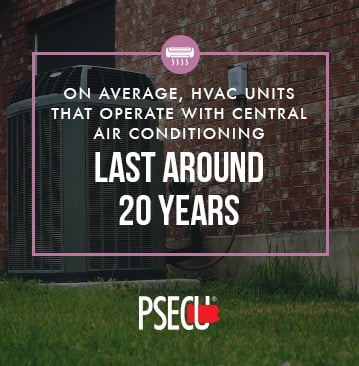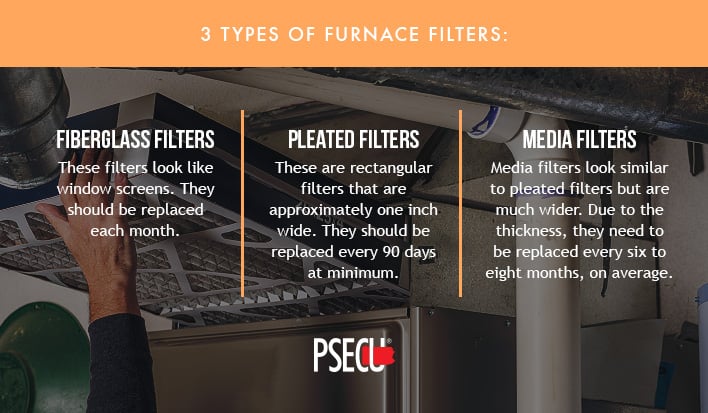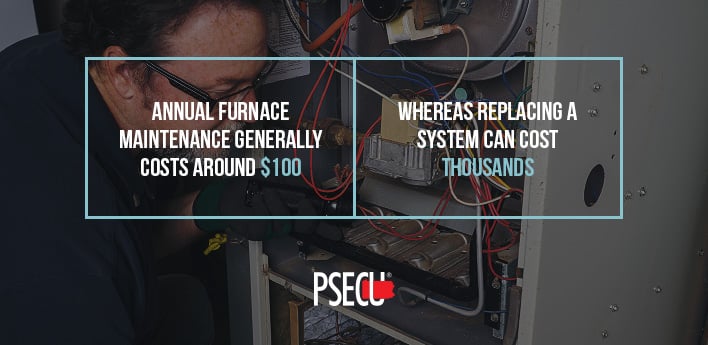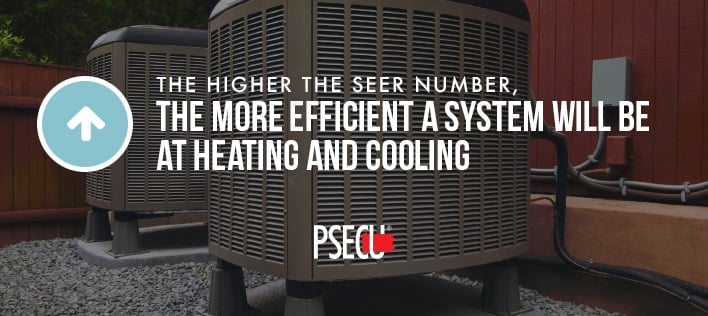HVAC systems keep your home at a comfortable temperature regardless of the weather outside.
It’s easy to take an everyday comfort, like the temperature inside your home, for granted until something goes wrong. However, replacement and repairs that could potentially be avoided through regular upkeep can be costly and inconvenient. Therefore, developing an understanding of your HVAC system and maintaining it properly should be at the top of your priority list.
What is a HVAC System?
To get started, HVAC stands for heating, ventilation and air conditioning.
HVAC systems are critical for keeping a home comfortable, and they’re used throughout the year. Therefore, when something goes wrong, it usually doesn’t take long to notice. Keeping your HVAC unit functioning at its highest level is critical.
At a basic level, HVAC systems are designed to control a home’s indoor climate. To do this, they utilize three core components: a cooled or warm air source; a tool to distribute warmed or cooled air to desired rooms and specific areas throughout a home; and a control system that functions to regulate the system.
To better understand the system, and which vent does what, take note of the fact that cooled and warmed air sources in a home generally use the same distribution and cooling system. This is why you probably only have one central thermostat that runs both systems. In many cases, the ducts between the walls are shared by both systems as well. An exception to this would include window air conditioning units or electric wall-heater systems that don’t function in conjunction with an actual HVAC system.
Each system operates based on the idea that heat moves from warm objects and spaces to cool objects and spaces. This means furnaces and other heaters push or force heat into the air to warm specific or desired areas, while air conditioners work by removing heat to lower the temperature.
Each of these systems also burn fuel of one kind or another. Furnaces usually run on gas, oil or electric. At a simple level, they burn the fuel they consume to produce warmer air that’s channeled through ducts or wires, then forced out of panels or registers. Some systems heat water, which is sent throughout the home to heat it.
Air conditioners use an electrical power source to cool coils. When warm air meets the “cooling coil,” its temperature is lowered, and it’s sent out to specific areas of the home using fans and other systems.
There are differences between each system and unit, of course, but this is a high-level overview of how your home maintains its temperature using a HVAC system.
How the Furnace Works
Furnaces operate by consuming the fuel that powers them. The result of this consumption is an output of heat that’s channeled to various living areas of the home through wires, pipes or ducts and blown out of radiators, vents, panels or registers.
When water is involved in the process, the furnace is accompanied by a boiler that stores and heats the water. Newer systems do not have boilers.
Understanding how the furnace works with your HVAC system is important. It requires maintenance and upkeep of its own.
Never Underestimate the Value of Regular Maintenance
No matter what, regular maintenance of all home systems is critically important for keeping your home operational and functional, as well as reducing the costs associated with replacing units more frequently than necessary.
 On average, many homeowners replace HVAC units that operate with central air conditioning after 10-15 years, even though the unit could last about 20 years. The lifespan of a central air conditioning unit depends on many factors. As a homeowner, it’s in your best interest to pay attention not only to the age of your unit, but also to its functionality. Regular air conditioner and heat pump maintenance is crucial.
On average, many homeowners replace HVAC units that operate with central air conditioning after 10-15 years, even though the unit could last about 20 years. The lifespan of a central air conditioning unit depends on many factors. As a homeowner, it’s in your best interest to pay attention not only to the age of your unit, but also to its functionality. Regular air conditioner and heat pump maintenance is crucial.
Sometimes replacing a working unit that’s still functional, yet operating at a lower level of efficiency, could save enough money on energy costs to make the replacement worthwhile. This is something to discuss with your HVAC service provider.
If it’s time to replace your HVAC system due to a poorly operating heat pump or air conditioner, it’s important to find the unit that’s most cost effective and energy efficient, and to have that unit installed correctly. Factors to consider when searching for a new unit include:
- A Seasonal Energy Efficiency Ratio (SEER) of at least 15. The higher the number, the more efficient a system will be at heating and cooling.
- A variable speed air handler or two-speed handler to increase efficiency.
- A thermal expansion valve to maintain efficiency even when other factors aren’t working at their optimal levels.
- An appropriate sensible heat ratio for your climate. Humid climates require systems that operate well at high-humidity levels.
- An ENERGY STAR®
When your new system is installed, be sure to have your installation professional look for leakage in air ducts and seal them if found. Additionally, be sure the airflow is equal in each room. This will help protect your investment while preventing the need for an additional service call.
To maintain your system while keeping it running at its highest level of efficiency, consider the following factors that affect the lifespan of HVAC units along with signs that it may be time for a replacement:
- Air quality. The salty or dusty air flowing through a unit can decrease its efficiency. Regularly replacing and/or cleaning filters can help combat this.
- Your unit’s size. If your unit seems “loud,” it may be that it is undersized for the size of your home. An undersized unit will reach its end of life before a properly sized unit.
- Age. If a heat pump or air conditioner is more than 10 years old, an ENERGY STAR® product may save money in the long run, even if the unit is still functioning. If a furnace or boiler is over 15 years old, a more efficient replacement may be a viable consideration.
- Programming. If your home is empty for long periods of time during the day, it doesn’t need to run at full force all day. A programmable thermostat can help increase the lifespan of your system without the need for discomfort.
- Humidity. A home that is humid has excess moisture in the air. This moisture could negatively affect the functioning of your HVAC system.
- If your home is dusty due to a remodeling project, extra exposed spaces like the attic or other factors, the dust could impact the functionality of your HVAC system.
Signs of Trouble with Your HVAC Unit
It’s important to understand signs of trouble with your HVAC system so that you can act quickly before a major problem arises.
It may be time to call in a professional if:
- You hear strange noises. Signs of trouble we’ve already mentioned that relate to sound include a system that’s operating overtime to keep up with your home and a damaged fan blade. If something sounds different, or unfamiliar, your HVAC unit may need attention.
- A few rooms are warmer or cooler than others. Your system should heat and cool your home evenly. If specific spaces seem warmer or cooler than others, duct problems or a problem with the HVAC system itself could be causing the problem. It’s important to note that this may not indicate trouble with your system. If this is the first sign of trouble, adjusting the air ducts to increase airflow to certain rooms and decrease airflow to others may be a simple fix.
- Your systems are reaching the end of their average lifespan. Take the time to familiarize yourself with the age of your HVAC system components to be better prepared to act if something seems “off.”
- Your energy bills are going up. The great thing about most utility providers is that you can track your usage over time. Look back over your heating and cooling cost histories (through your electric bill, oil bill or natural gas bill). If temperatures outside have been fairly consistent but you’re using more energy than before, your system may need attention.
Not all problems require a complete replacement, but some might. Be as proactive as possible, and be prepared to act when you sense something may be wrong.

Read our other chapters
Chapter 1
Why Maintenance Matters and How to Budget for It
Chapter 2
Plumbing Maintenance — From Snaking a Main Drain to Dealing with Hard Water Clogs
Chapter 3
Well Maintenance — Water Well Maintenance Starts With Understanding Groundwater Basics
Chapter 4
Septic Tank Maintenance — Preventative Care for Your Tank and Spotting Warning Signs
Chapter 5
Sewer Line Maintenance — From Understanding How Systems Work to Spotting Clogs
Chapter 6
HVAC System Maintenance — Keeping Your Home Comfortable Throughout the Year
Chapter 7
Insulation — Better Insulating Your Home and Preventing and Addressing Drafts
Chapter 8
Home Exterior Maintenance — Saving Costs by Identifying Seasonal Tasks
Chapter 9
Home Improvement Ideas — Adding Value to Your Home and Getting a Return on Your Investment
Download all chapters as a PDF.
The content provided in this publication is for informational purposes only. Nothing stated is to be construed as financial or legal advice. Some products not offered by PSECU. PSECU does not endorse any third parties, including, but not limited to, referenced individuals, companies, organizations, products, blogs, or websites. PSECU does not warrant any advice provided by third parties. PSECU does not guarantee the accuracy or completeness of the information provided by third parties. PSECU recommends that you seek the advice of a qualified financial, tax, legal, or other professional if you have questions.



